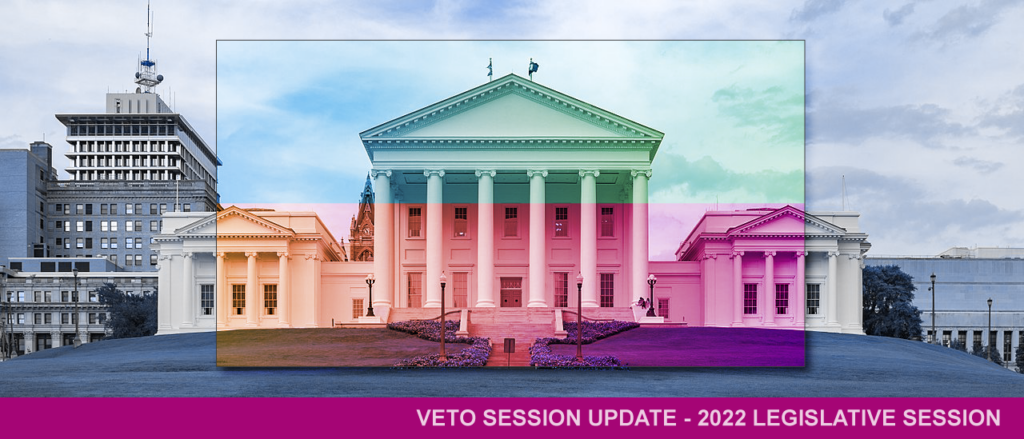Veto Session Update – 2022 Legislative Session

Every legislative session in Virginia culminates in a brief “Reconvene” or “Veto” session where the General Assembly considers any vetoes or amendments from the Governor. On April 27th, legislators gathered to act on approximately 100 bills that Gov. Youngkin proposed amending, as well as 26 bills that he vetoed. Several of those bills directly implicated our policy work.
Amendments:
With partners from the civil rights, student justice, and disability communities, we opposed an amendment from the Governor to SB36/HB4 that would have expanded mandatory reporting of school offenses to police in ways that would have placed many students, particularly students of color and students with disabilities, at risk of court involvement. Thankfully, together with our partners, we were able to defeat this proposed amendment in the Senate.
SB474/HB614, patroned by Sen. McClellan and Del. Bourne, that was intended to ensure indigent tenants would not have to pay a bond to appeal an eviction for nonpayment of rent, also came back with an amendment from the governor that would have gutted the intent of the bill. We worked with our partners at Virginia Poverty Law Center (VPLC) to successfully defeat the amendment.
Vetoes:
Unfortunately, Governor Youngkin vetoed HB573 from Del. Clark, a bill that would have helped Virginians struggling with medical debt by setting clear timeframes on obtaining court judgements against people for unpaid medical debt. He also vetoed SB297 from Sen. Deeds, which would’ve helped prevent debt collectors from harassing crime victims seeking help from the Criminal Injuries Compensation Fund. We and our partners at VPLC disagree strongly with the Governor’s explanation & released a joint statement opposing these vetoes.
The Governor also vetoed HB802 from Del. Price, which would have allowed localities to better enforce health and safety standards against landlords who were not addressing property violations. We supported our partners at VPLC on this legislation and likewise strongly disagreed with the Governor’s veto.
The Budget:
We are still anticipating the General Assembly budget conferees’ release of their joint budget proposal for the next two years, which the two chambers were unable to agree on before the regular session adjourned in mid-March. Talks have been ongoing, but it’s unclear when a final product will come back before the full General Assembly for consideration. At LAJC, we are watching particularly closely how negotiations will determine K-12 school funding priorities, state spending on housing supports, and how the criminal legal system is shaped and reshaped through the budget.
We faced many challenges this legislative session, and there is still so much work to be done—not simply to preserve our gains in recent years, but to advance equity, opportunity, and access to justice for the communities we partner with. And we cannot do it alone—we remain so grateful for your support, whether in struggle or in triumph. .
